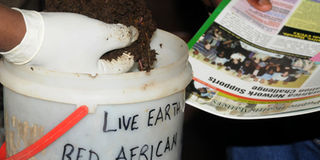Makerere to breed earthworms

Some of the earthworms being displayed at Makerere University recently. Courtesy PHOTO
What you need to know:
Innovative. The the project lead researcher says their strategy is to use scientific innovation to integrate earthworm production into livestock and crop production as the main sources of income for rural areas.
Kampala.
Makerere University has started breeding earthworms with the aim of adding value to animal feeds.
If the project picks, the researchers plan to scale it up for commercial purposes and job creation for the youth.
Dr Fred Kabi, a researcher at Makerere University College of Agriculture, said their strategy is to use scientific innovation to intensify and integrate earthworm production enterprise into livestock and crop production as one of the main sources of income for rural development.
“We had specific interest in earthworms. Birds that come from the cattle corridor are big and healthy because of proteins they get from eating earthworms. We have decided to domesticate the earthworms. We are adding value by first drying them and turning them into powder before they can be added to supplement animal feeds,” Dr Kabi said.
Processing the worms
According to Dr Kabi, the earthworms are dried using solar and milled to produce earthworm meal.
This is then evaluated and used as supplement to fish and poultry feeds. However, it is not yet clear how many worms are needed to make a kilogram of powder.
He was speaking at an innovation exhibition at the university where United States Agency for International Development (USAID) under Resilient Africa Network (RAN) pledged to support them incubate, test and expand the worms production.
Prof William Bazeyo, the Dean Makerere University School of Public Health, and RAN chief of party, warned the researchers to ensure that their findings benefit the local communities.
For instance, Prof Bazeyo said there are countries which eat the earthworms and feared that the country might end up exporting them instead of improving the primary role of the research.
“We are moving away from students coming to Makerere, study, get marks and go away. We need to change the communities we live in. If you are poor and have gone through Makerere, it is entirely your fault. You have the brains. Use them and work with teams,” Prof Bazeyo said.
Dr Kabi said he was motivated to carry out the research after realising that importation of meat into the region has been growing annually at a rate higher than six per cent.
He argues that poultry imports top the list with 11 per cent growth rate and this practice robs away the immediate source of employment for the youth and women.
To him, the study will turn the challenge of extreme hunger, rapid population growth, urbanisation and demand for foods of animal origin into an opportunity by engaging the private sector, farmers and scientists to work together in a public-private partnership.
This, he says, will offer sustainable solutions to existing challenges of low livestock productivity.
“This study will therefore seek to use scientific knowledge blended with indigenous knowledge to make scientific inquiry into harnessing earthworms from the local environment, breeding them and assessing their impact as source of protein on local poultry productivity,” Dr Kabi said.
Dr Kabi explains that since the global demand for animal feeds is likely to double within the next 25-50 years, especially with the projected global population increases to 8-10 billion, this presents an opportunity of employment to the youth and women to engage in poultry production to meet the demand of tomorrow’s food requirements by the ever increasing human population.




